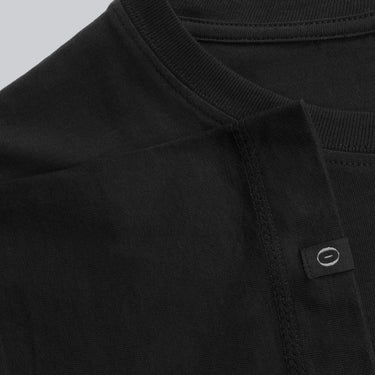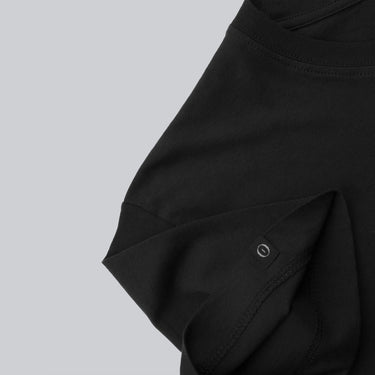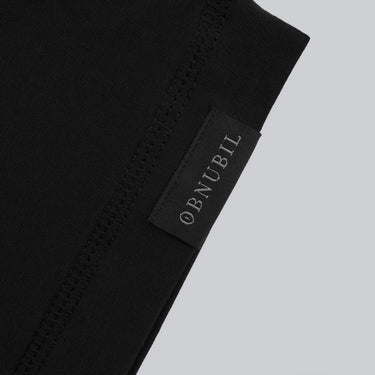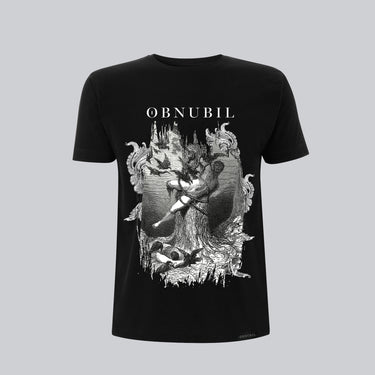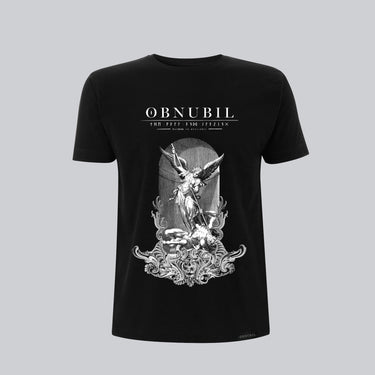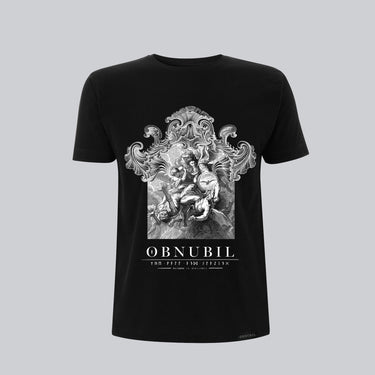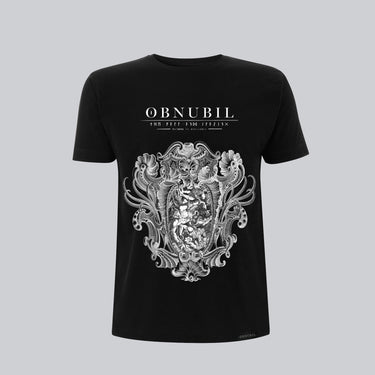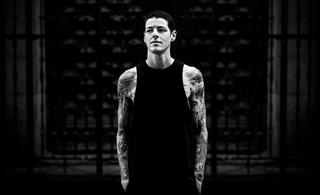
Switzerland has long been a hub for innovative and boundary-pushing music, and Hubris. stands as a testament to that tradition. This instrumental post-rock band has carved out a distinctive sonic identity, blending atmospheric textures, intricate melodies, and powerful crescendos to create music that transcends words. At the heart of this creative force is Jonathan Hohl, guitarist and composer, whose artistry helps shape the band's expansive and emotive soundscapes. In this interview, I delve into Jonathan's approach to music, the inspirations that fuel Hubris's music, and the challenges of crafting instrumental storytelling. From the Swiss mountains to the depths of the human experience, join me as I explore the creative mind behind one of Switzerland’s most captivating post-rock acts.

INTERVIEW
OBNUBIL: Hi Jonathan! First of all, thank you so much for taking the time to share your thoughts with us. Could you share some insights into your musical background? What first sparked your interest in music, and what inspired you to pursue it as a career?
JONATHAN: Hi! Thank you for having me on this.
My very start at music wasn’t exactly deliberate as my three brothers and I were forced by my parents to pick up an instrument. My parents decided I was to start playing the piano, which I did when I was about 6 years of age. The deal we agreed on was that if we managed to make it through three years with that instrument, we could pick the next one. So after three years of “playing” the piano, I finally got to pick the instrument I really wanted to start playing by then; the guitar. I’ve been playing the guitar ever since I turned 9.
I had always dreamt of becoming a professional musician but being from a very career-oriented family, I was quickly convinced not to pursue it and it was only way later in life that I decided to actually give it a go, being too scared I would regret it later in life. I studied British Literature at university and when I was 28 years old and about to either embark on further studies to become a teacher or quit everything to pursue music, I chose the latter. I think it was more situational than something really inspiring me at that point in my life. It was my one opportunity (logistically-speaking) to try it out and I just took it.
OBNUBIL: Your band hubris. was formed in 2014 in Fribourg. Can you tell us how the band came together? Describe us your music in your own words. What makes you unique?
JONATHAN: We started out as a metalcore band with some post-rock/ambient influences. We had always had that unique “post-rock” side to our band and when we disbanded in 2013 because we couldn’t find ourselves in the music anymore, some of the musicians decided to start over and only keep the post-rock elements. It took a little over two years and a few members change before we could finally have some music that we were all satisfied enough with to put out, but this is how it started. The very first album we released was more of a traditional approach to post-rock and it is really with the release of our second one (Apocryphal Gravity) that we started defining and refining our sound more. At that point, we were really inspired by electronica and minimal electronic music and we really wanted to incorporate it in our songs. Add to this the progressive and metal touch that we started with and you get hubris.
OBNUBIL: Your latest album "The One Above", just like your three previous albums, delves into Greek Mythology. This one incorporates an additional concept by exploring the works of Plato and his allegory of the cave. The allegory is divided into four distinctive parts which are represented by each of the songs. The album can be interpreted in two ways. Can you tell us more about this?
JONATHAN: If one is not familiar with the allegory at all, I recommend reading about it - it is incredibly thought-provoking. But anyway to us, the allegory can be interpreted in two ways. Either someone manages to escape the cave to discover the “true” world or once they have made it out they decide to come back in because they feel like the “fake” world is “truer”. The name of the songs represent each of the four stages of the allegory, but they are not strictly to be listened to in one order or the other. It can and should be discovered in both ways. First by starting the album with “The One Above” then running it to “Beneath Othrys” and starting the album with “Beneath Othrys” and finishing it with “The One Above”. The latter would be the “logical” order of the allegory - or at least the order in which Plato presented the allegory.
OBNUBIL: During the whole month of last September 2024, you have been touring around Europe. At this point, I must mention that it has been a real pleasure to have met you, to have taken some portraits of you and to have been able to enjoy your concert! How was the tour in general? Any incidents?
JONATHAN: Thank you again for the pictures. I had a great time meeting you as well. We had a couple of interesting interactions while we were taking the pictures, it was fun.
The tour went extremely well, it was the second time we had made it to Spain and the turn-out seemed to have nearly doubled since last time, so we are very satisfied with the growth we’re seeing.
There was unfortunately one incident in the tour, we had to cancel one of the shows during the UK-Ireland leg because we missed our ferry that day and couldn’t make it in time to the venue that evening. We gave our passports to the hotel’s reception at check-in and they forgot to hand them back in the morning when we left (we also forgot to ask them to) and we only noticed we didn’t have our passports when we got to the harbour. By the time we got back to the hotel and the harbour again with our passports, the gates were closed and we missed the ferry. The only other ferry to the UK from Ireland that day was 6 hours later which made it impossible for us to make it on time to the venue before the curfew. That’s the problem with playing every single day, a small mistake like this can cost you a show and it’s an easy thing to oversee.

OBNUBIL: Is there any concert from this tour that particularly stood out to you as a personal experience? And what’s the wildest thing you’ve seen or done on this tour?
JONATHAN: Every show is unique and sometimes it’s not necessarily about the show itself but more about how one feels that day. We always ask ourselves after the tour which show each member preferred and it always varies from one person to the next. For me personally, it’s often not only the show in itself, but also everything surrounding it. Was the accommodation great, did we get good food, were we financially viable, did we get good sleep, etc.
I don’t think I can publicly say some of the wildest stuff we saw on tour, hahaha. But to keep it safe, someone asked us to sign their vinyl with a unique twist and being childish baboons, we drew various pictures of male genitalia, and they absolutely loved it.
OBNUBIL: You have also recently been touring Mexico during December! In which countries do you perceive more post-rock lovers than in others? Where have you not played yet and would you love to play?
JONATHAN: I think there are overlaps between progressive music and post-rock/post-metal. A country where there is a decent metal community usually also harbours a big post-rock fanbase. People that listen to post-rock only are extremely rare, it’s usually people with a wide music taste in which post-rock is also included.
We have never played in Japan and China and would love to include both these countries in regular touring schedules.
OBNUBIL: Post-rock compositions can be long and sprawling. How do you keep your guitar playing fresh and engaging over the course of a 10- or 15-minute track without relying on traditional song structures? How do you keep the energy and flow alive during these extended performances? Any secrets for keeping the audience engaged in the journey without lyrics?
JONATHAN: I never actively try to make a 10 or 15 minute long song, it just happens to end up being this long somehow. My music is supposed to be introspective and take you on a “trip” within oneself and I feel like this is hard to achieve without taking some time. It is definitely possible and in reality I actually try to make is as effective as possible every time, sometimes it’s just the length I feel like a certain passage deserves. Most of the time we actually shave off some minutes of songs for a live performance because the entire vibe is different when it is played live. It doesn’t need to be as long in that specific setting. What I try to do when composing, is to stop thinking as a composer as often as possible and just listen to how the song/passage makes me feel. It might end up adding or taking away seconds depending on how it felt in the moment.
I don’t think I have a “secret”, it’s more like an advice, but as soon as I feel “bored” as a listener I know it’s when something needs to happen in the song. I always use the song Hey Now by London Grammar to remind myself of how effective a song can be. Every single 4-bar loop something gets added to the song (e.g. a guitar, a melody, a pad, vocals, etc.). To me that’s the quintessential example of effectiveness and this is what I strive for when composing.
Lastly, there is a reason instrumental music is not the dominant style. It’s because we are all drawn to simple melodies, simple lines that we can sing along to. Keeping this in mind, it is extremely important to find something in instrumental music to replace the human voice. It can be anything but there needs to be something which takes more of the focus than the rest and it has to be “singable”.
OBNUBIL: Now that we know a little more about you, let me ask you a bit more about your musical journey. Swiss cheese or Swiss precision? If you had to describe your guitar playing using one of these, which would you choose and why?
JONATHAN: In general I’m more of a Swiss precision type of person and this for multiple reasons. I love time pieces, I always have and I am your typical Swiss person. I am never late, I love being somewhere 2-3 minutes early and more than 5 minutes late is blasphemy to me. This being said, when it comes to my guitar playing I think I used to follow my personality and stick to Swiss precision but now with age I am feeling cheesier and cheesier. Shredding has definitely lost aura to me and a great guitar tone has definitely taken over.
OBNUBIL: What is it about the vast, atmospheric nature of post-rock that attracted you as a guitarist? Was there a specific moment or song that drew you into the genre?
JONATHAN: I discovered the style very late into my musical journey. I remember one song in particular that a friend of mine made me listen to and it definitely had a huge impact on my relationship with music. I can recall exactly how it made me feel and it’s been the feeling I’ve been trying to recreate ever since. The song is called Taijin Kyofusho by the band The Evpatoria Report. I actually found out later that they’re also from Switzerland.
OBNUBIL: If your guitar could talk after a long post-rock jam session, what would it say to you?
JONATHAN: “Are you sure you’re okay?” Hahaha
OBNUBIL: Switzerland is famous for its stunning landscapes. Do you ever find inspiration for your music in the natural surroundings? Can you recall a specific moment where a place in Switzerland sparked a new idea for a song?
JONATHAN: Oh yes 100%, I get really inspired by being outdoors. I don’t think there’s a specific moment that sparked an idea, but I hike very often so it’s very often that I’ll find myself inspired following a day of nature exploration. There’s a hike I would recommend that’s a hidden gem in Switzerland, it’s called Pont de Nant. You’re stuck within a small valley and it almost seems like you’re cut out of civilization completely.
OBNUBIL: Post-rock guitar often involves building layers of sound. How do you approach layering and creating atmosphere in your compositions? The use of effects and textures is key. Do you have any unusual or unexpected techniques or pedals that are essential to your sound? How do you balance technology with the raw emotion of playing?
JONATHAN: I think one of my favourite things to do on guitar is to mess around with a looper pedal. I love trying to find some gaps within one pattern and filling it with another intricate pattern. Almost like trying to fit more droplets of rain within a rainfall until you’ve got a slab of water.
To me the guitar is so versatile you can think of it as either a human voice, a pad, a rhythmical instrument or simply added textures. I have the most fun trying to make a guitar take the role of all of the elements needed for a song.
There’s one pedal in particular that really inspired my way back at the start of my post-rock journey and it was the Nova Repeater by TC Electronics. It’s not your usual delay pedal, it’s almost a category of its own.
Regarding the use of technology, I’m actually scared it is starting to take a little bit too much space in my life. I am more and more inspired by acoustic guitar playing and it’s definitely something I have been wanting to do more for a long time. I think it’s not only necessarily linked to music technology but how technology is just taking so much space in my life that I’m almost starting to resent it. It’s almost become irreplaceable, which I hate.


OBNUBIL: In the world of post-rock, silence can be as important as sound. How do you approach the balance between creating space and filling it with texture and layers in your music?
JONATHAN: I don’t think silence is particularly inspiring to me but textures are. But textures can be interpreted as silence somehow. There’s something scary about complete silence to me so I tend to avoid it. But I do love “rest” and “space” which I think are both extremely important aspects of ambient music. I believe it’s a good habit to try and take stuff out of the music rather than adding some in.
OBNUBIL: Post-rock sometimes feels cinematic in scope. If one of your songs was chosen for a film, what kind of scene would it underscore? What movie genre do you think your music fits best with?
JONATHAN: Although it’s definitely not what inspires me, I always thought some of the songs I create would go really well with a battle scene. There’s a before the battle when it’s the calm before the storm, the actual storm and then the consequences and ultimate results of the storm.
OBNUBIL: Is there a Swiss artist or musician outside the rock genre who has had an unexpected influence on your guitar work? Where do you derive your influences in general? What are the last three albums that have you hooked?
JONATHAN: There was a metal band back in the day called Promethee from Geneva and they had a big impact on my metal years. I don’t know how much has transpired to my post-rock environment but every influence ended up shaping the musician I am today so I would definitely put them at the top of my list.
I rarely have time to actually listen to a whole entire album so this is going to be a hard question to answer but I think the last three would be:
- Harry Styles’ Harry’s House.
- The Zenith Passage’s Datalysium
- Dua Lipa’s Future Nostalgia
Now that I’ve listed these three albums I’m just realising how wild this looks, hahaha.
OBNUBIL: If you could collaborate with any famous Swiss figure from history or culture (musician or otherwise), who would it be, and what kind of project would you envision?
JONATHAN: This is going to be cheesy, but probably my godfather (Pierre Repond) who’s a photographer, writer and sound designer. We’ve already collaborated in the past - he wrote the monologue in our song Icarus that I have then translated and narrated. I would love to sit in the studio with him and just try to compose an entire album of whatever comes to mind.
OBNUBIL: Are there any new genres or styles of music you’re interested in exploring? How do you envision the future of your sound evolving? Are there new cinematic or sonic territories you'd like to explore in your upcoming projects?
JONATHAN: My year 2025 resolution was to finally work and release a project I have had in mind for a long time but never actually finished. It’s a funk-rock project that I have put aside for way too long and I feel like it’s time I release it into the world with no intentions whatsoever. I’d just love to say I’ve done it. So I guess to answer your question, funk related music.
As far as hubris. and post-rock is concerned, I’m working on my new album at the moment and although I have never told myself I wanted my songs to sound more a certain way or another, I really like where the last album was headed. I am keeping a similar approach for this new one.
OBNUBIL: It has been a pleasure talking to you and getting to know you a little more! Thank you so much for taking your time answering the questions! Is there anything that you would like to say to the readers and to your fans?
JONATHAN: Thank you so much for all of your great questions! If I had to give any advice at all regarding music in general, it would be to never allow yourself not to have fun. Music has always been a way for me to escape mundanity but more importantly to make time matter. Every second of every day is as special as the next and there is nothing easier than music to make it extra special.
Interview done February 2025. Promo photos by Jaqueline Vanek / Obnubil Studio.



